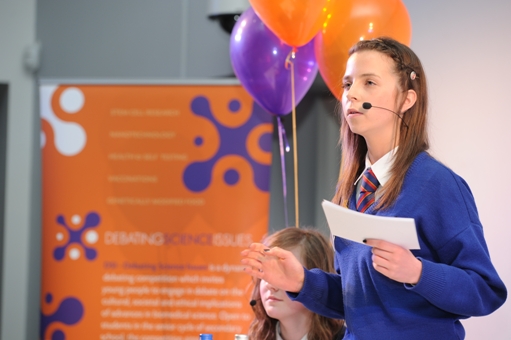Debating Science Issues All Ireland Final - Winners Announced
Congratulations to St. Vincent’s Secondary School, Dundalk, Co. Louth who recently won the 2011 All-Ireland Debating Science Issues Competition. The grand final, which took place at the Science Gallery at Trinity College Dublin, was the result of a field of 56 schools narrowing to just four. In a confident display, the team from Dundalk successfully persuaded the esteemed judging panel, that “animal testing is necessary for the advancement of disease treatment”. The runners up were Colaiste an Phiarsaigh of Glanmire, Co. Cork with St. Catherine’s Vocational School, Killybegs, Co. Donegal and St. Joseph’s College, Garbally, Co. Galway making up the final four.
Debating Science Issues is a cross-border schools science debating competition supported by a Wellcome Trust People Award for four consecutive years and is supported by eight partners: the Regenerative Medicine Institute (REMEDI) at NUI Galway, W5 in Belfast, Biomedical Diagnostics Institute (BDI) at DCU, the Royal College of Surgeons Ireland, CRANN at TCD, CLARITY at UCD, Tyndall National Institute and Alimentary Pharmabiotic Centre both at UCC. Co-ordinated by REMEDI’s Outreach Officer Danielle Nicholson, the competition encourages young people to engage in debate on the cultural, societal and ethical implications of advances in biomedical science.
Schools taking part initially receive a 3-hour biomedical, bioethical workshop to facilitate discussion on the ethical issues raised by stem cell research, genetically modified food, nanotechnology, health and self-testing kits or flu vaccinations. School students research further in preparation for the debate motion related to the initial workshop. From there, the debate motions circulate so that students debate on an array of controversial topical issues. Boston Scientific and NUI Galway’s College of Science sponsored the provincial trophies and prizes. A brilliant initiative which encourages young people to look at the ethical and societal implications of up to date scientific research. Well done all involved!


Comments